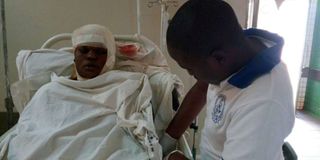It's time to address SGBV, sexual and reproductive health in the Horn of Africa

A doctor attends to a GBV victim. The County Government of Mombasa has opened five 24-hour call centres to tame such vices.
What you need to know:
- SGBV encompasses behaviours like sexual violence, intimate partner violence, and harmful practices such as female genital mutilation (FGM) and child marriage.
- These acts severely affect survivors' physical, mental, and emotional well-being, often limiting access to vital SRH services.
The 16 Days of Activism against Gender-Based Violence (GBV), running annually from November 25—International Day for the Elimination of Violence against Women—to December 10, Human Rights Day, is a call to action to end violence against women and girls. In 2024, the campaign theme, “Every 10 Minutes, a Woman is Killed. #NoExcuse. UNiTE to End Violence against Women,” highlights the urgency of addressing GBV’s devastating impact worldwide.
In the Horn of Africa, the intersection of sexual and gender-based violence (SGBV) and Sexual and Reproductive Health (SRH) is particularly concerning. SGBV encompasses behaviours like sexual violence, intimate partner violence, and harmful practices such as female genital mutilation (FGM) and child marriage. These acts severely affect survivors' physical, mental, and emotional well-being, often limiting access to vital SRH services.
Women and girls in the region who endure sexual violence are at higher risk of unwanted pregnancies, sexually transmitted infections (STIs) like HIV, and other reproductive health challenges. Additionally, the trauma from SGBV often results in mental health issues such as depression, anxiety, and post-traumatic stress disorder (PTSD). These challenges are compounded by barriers to SRH services, including stigma, discrimination, and a lack of confidentiality.
In humanitarian contexts, such as during conflicts or natural disasters, the breakdown of health systems exacerbates these issues, leaving women and girls particularly vulnerable to SGBV and deprived of critical SRH care.
Addressing SGBV and SRH in the Horn of Africa
The 16 Days of Activism provides an opportunity to address the intersection of SGBV and SRH through comprehensive strategies. The USAID-funded Cross-Border Community Resilience (CBCR) activity operates in border areas of five Horn of Africa countries to tackle high rates of violence and inadequate health services. This approach integrates SGBV prevention with SRH service delivery, focusing on systemic and community-level solutions.
Here are critical strategies to address SGBV and SRH issues:
Raising awareness and education
Public awareness campaigns can challenge societal attitudes towards SGBV while promoting the importance of SRH. Education targeting both men and women should emphasise gender equality and respect for women’s rights.
Strengthening health systems
Health systems must be equipped to deliver comprehensive SRH services, including emergency contraception, post-exposure prophylaxis (PEP) for HIV, and psychosocial support. Training healthcare providers to recognise and address SGBV can significantly improve care quality for survivors.
Legal and policy reforms
Governments must adopt and enforce laws protecting women and girls from SGBV while ensuring access to SRH services. This includes criminalising all forms of gender-based violence and removing legal obstacles preventing survivors from seeking care.
Community engagement
Community leaders, including religious and traditional figures, can challenge harmful norms and advocate ending practices like FGM and child marriage. Community-based initiatives can also provide survivor support networks and improve access to SRH services.
Support services for survivors
Comprehensive support services, such as medical care, counselling, and legal assistance, are essential for survivors’ recovery and empowerment. Establishing safe spaces and shelters offers immediate protection and support for women and girls escaping violence.
Economic empowerment
Supporting income-generating activities for SGBV survivors can enhance their economic resilience, reducing vulnerability and promoting independence.
Capacity building
Training law enforcement and advocacy groups on SGBV response and referral pathways ensures a coordinated and survivor-centred approach.
Health worker training
Educating health workers and community volunteers on SRH rights and services helps expand access to care for survivors.
Embedding SRH into primary healthcare
Incorporating SRH services into primary healthcare systems, alongside outreach programmes, ensures accessibility for marginalised populations, particularly in remote and cross-border areas.
Community-driven approaches
The CBCR initiative’s holistic strategies address the unique challenges of cross-border communities, such as economic instability, cultural norms, and limited healthcare infrastructure. These interventions align with the 16 Days of Activism’s goals, advocating multi-sectoral collaboration to end GBV and improve access to essential health services. By integrating SGBV prevention with SRH care, the CBCR fosters resilience among women and girls while creating sustainable systems to address the root causes of violence and inequality.
A call for collective action
The 16 Days of Activism against Gender-Based Violence is a powerful reminder of the persistent global struggle to end violence against women and girls. Addressing the intersection of SGBV and SRH is vital to ensuring that women and girls live free from violence and have access to the health services they need. Governments, international organisations, communities, and individuals must work together to create environments where all women and girls can live with dignity and respect. Through sustained commitment and collaboration, we can build a future free from violence, where every woman and girl can thrive.
The writer is a media and communications practitioner ([email protected]).




